This post has not been edited by the GamesBeat staff. Opinions by GamesBeat community writers do not necessarily reflect those of the staff.
 Good Old Games pulled a fast one on players at the end of September in a PR stunt that felt as if they had sprung a trap on everyone and chuckled when pies hit the fan instead. Not a lot of people were amused, but at least the service wasn't going anywhere.
Good Old Games pulled a fast one on players at the end of September in a PR stunt that felt as if they had sprung a trap on everyone and chuckled when pies hit the fan instead. Not a lot of people were amused, but at least the service wasn't going anywhere.
Online distribution services like Good Old Games, Direct2Drive, and Steam are quickly becoming the last outposts that are keeping some of the classics alive; titles PC players like myself had grown up with over the years. This is also a problem with console games and many of the niche titles that quickly disappeared from stores in the following years.
It's a hard truth for our hobby in that many games won't be around on shelves years later. Unlike Catcher in the Rye or The Terminator, Snatcher on the Sega CD isn't that easy or cheap to get a hold of. When you miss your opportunity to pick up a particular title and want to get back to it sometime down the road, you could be screwed. Add to this the dubious nature of ROMs and "abandonware" with their own unspoken role as the only means that some players can experience the classics – while at the same time offending potential copyright issues – and it can be confusing on just what options we have available to us to keep such games alive.
Things are getting better, though, for a new generation of players on PCs. Consoles, too, are reaping the benefits of a maturing broadband network with the Playstation Network, Xbox Live, and the Virtual Console on the Wii delivering favorites from the past. It's not a complete library in any of these cases, but it's far better than the alternative of letting the classics languish to the point where the only proof of their existence is left only as a blog entry, a 5.25 floppy moldering in someone's basement, or a cartridge left in your NES when you moved it into storage by accident.
But digging through all of the fun stuff is hard when you're not sure what you want or are looking for, especially for PC players that are curious about what they've missed out on – the kind of classics that introduced many of the things that we take for granted today. With that in mind and building on fellow community writer Daniel Sims' article on Console Retroists, I've scoured Steam, Good Old Games, and Direct2Drive for list of goodies to help out with a few friendly suggestions focusing on the classic CRPGs available from each service.
If you can:
…ignore the graphics…
…find the patience to immerse yourself in character creation…
…put up with random encounters…
…then you'll find hundreds of hours of adventure just waiting for you in the next few pages!
So in no particular order, here we go…
Planescape: Torment (1999)
An NPC asks “What can change the nature of a man?” Guess what, berk, you're going to find out. If a book could transform itself into an RPG, Planescape: Torment would already be there waiting for it.
Players star as the 'Nameless One', a virtual cipher that they will lead on a quest to discover the answer both as to who they are and why they can't die. You'll rub elbows with gods, godlings, succubi, devas, and a host of other bizarre and powerful characters, some of whom might help as a party member or become your worst enemy. Planescape's multiversal view and the quest's unique journey through its crossroads of existence also create a wonderfully unique setting complete with its own slang. This is a game that embraced the AD&D source material and then squeezed even more ideas out from its pages thanks in no small way to designer, Chris Avellone's, fevered imagination.
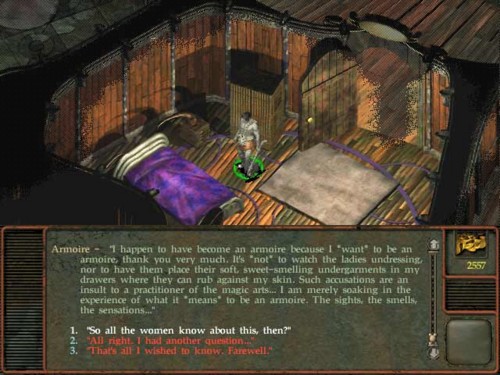
In Planescape, expect the unexpected. The really unexpected.
Death isn't even the end. Instead, if your Nameless One happens to die, it could even reveal clues on what to do next when he wakes up on a slab. The problem is that someone somewhere may have had to die in order to give you life. Well, no one said this was a perfect existence.
The only downer for some is in its own nature: this is a deeply story driven experience right up to the climax with layer upon layer of dialogue choices branching off of each other (which is also stat driven…being as smart as a rock will only give you so many options). The script for it is reportedly 800,000 words long. I didn't count every word to confirm that, but be warned: it will drown the eyes of the unprepared. For someone who loves a good story like myself, though, I loved every word.
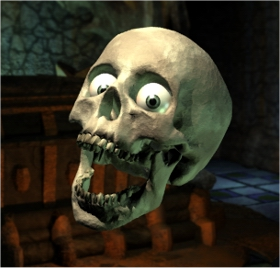 Several NPCs also had deep storylines of their own to explore that could have easily doubled as their own separate game. Many encounters, including the incredible climax, teased with enough possibilities within what was being said that I went through it again with different stats just to find out what I missed.
Several NPCs also had deep storylines of their own to explore that could have easily doubled as their own separate game. Many encounters, including the incredible climax, teased with enough possibilities within what was being said that I went through it again with different stats just to find out what I missed.
For those that just want lots and lots of combat, this is going to come off as a strange experience since that's not the focus of getting through the game even though it might help in certain encounters. Don't even expect to end the game with an inventory filled to the pixels with loot gear or whose purse is weighed down with tons of dragon fired gold. But for everyone else that wants a gripping story taking them through the planes of existence, Black Isle's magnum opus is as good a place as any to get the journey started.
Just remember, don't trust the skull.
Where to find it:
Arcanum: Of Steamworks & Magic Obscura (2001)
Taking place in a steampunkish world of Victorian flavor and buried magic, this is also a game whose production values took as much pride in writing a proper manual as it did in fleshing out its world. The book, because that's what it feels like, is written in-character from cover to cover. It's also an indication of the kind of lavish attention to detail that you'll find in one of the best RPGs ever invented.
Simply jumping into this game isn't an option thanks to an incredibly deep character creation system that puts a lot of control into the player's hands from the beginning. Choosing to be anything from a human to an elf, and getting a huge paragraph describing what they're good at and their place in the world at large, was only the tip of the creation iceberg.
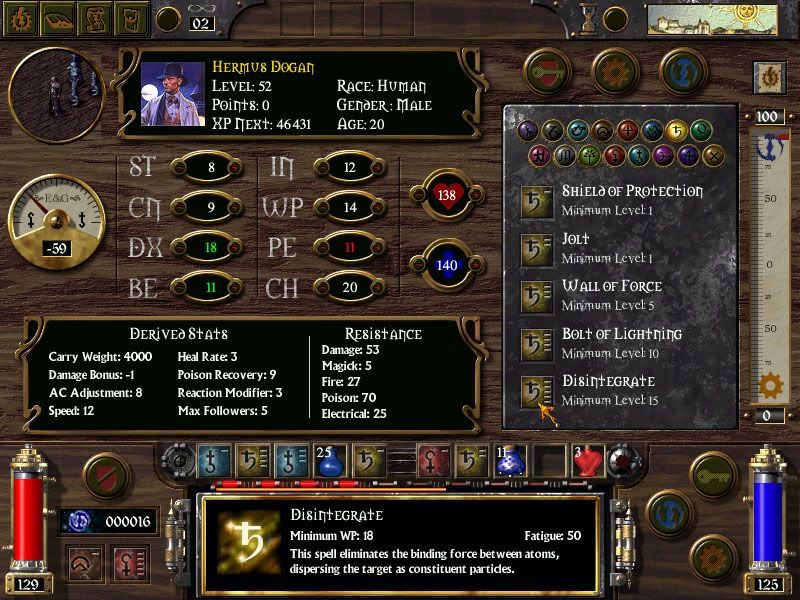
There are plenty of options to help create the character of your dreams. This is the kind of game that encourages you to play with its mechanics in as much as it wants you to experience its world.
You could even choose a background to influence certain attributes for your character from Bully to Beat with an Ugly Stick. I spent a few hours on trying to find the right mix of skills for a character I could be happy with my first time in. Then went back and started a new one anyway when I wanted a little more technical oomph. Players won't be completely alone, either, and might even be able to find a few friends along the way to help out.
It's virtually classless, like Planescape: Torment. This is a world where you can light up foes with fire from your fingertips, or later learn how to craft weapons that can obliterate them where they stand. How you go about it is up to you and the skills picked up along the way. It will also play deeply on what you mold your character as. Statistics and even race are important considerations here. There's no telling in advance who will react more favorably to an elven engineer or a human adventurer.
Storywise, the game was created by many of the same hands that put together the first two Fallout titles at Black Isle. It's also as much of a sandbox in which the player is relatively free to experiment and do nearly anything that they want. If they want to live up to being a Bully and fight everywhere they go as the shortest means to an end, then go for it. If they want to talk their way through instead, more opportunities might open up even though that weapon you had your eye on will remain in someone else's hands.
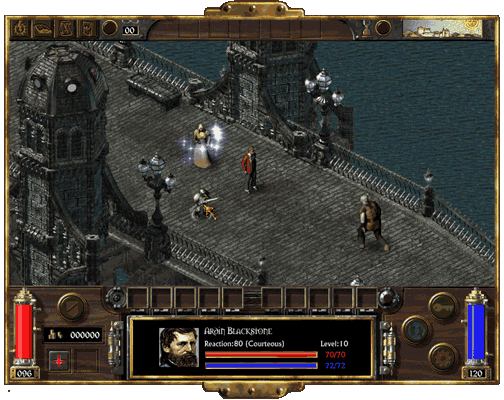
Firepower or the power of fire? That's up to you!
The details worked into Arcanum's world is laid out by the sheer deluge of lore present within the game itself. If the manual wasn't enough, there are NPCs and in-game books that will spell out the history of Arcanum's world and the philosophies behind living with both magic and technology. Players were free to roam as far as their feet and their survival skills could take them and that's the first thing that I had (unsuccessfully) tried to do in the hopes of stumbling over a bit of treasure along the way. I can't help it. If a game sets me loose to explore, that's exactly what I'll do.
Perhaps the biggest strike against it was that it was buggy on release. As in "quest breaking buggy". I patched mine before I started playing it years ago, though from what I've read, GOG's copy is updated with the latest official patch. Still, it's technical state didn't sit well with many players and had given developer, Troika Games, something of an infamous reputation for imaginative worlds plagued by technical issues.
But give it a try. There's even an unofficial patch out there that fixes even more stuff thanks to dedicated fans that are still playing the game after nearly ten years.
Where to find it:
Fallout and Fallout 2
Post-apoc CRPG games were something of an unexpected aberration that went against the niceties of elves and orcs. They seemed out of place alongside the Ultimas and Wizardries of the genre (not so much among the PnP crowd, though).
But when Wasteland from Interplay at EA had come out, its solid gameplay and sandbox world pulled me in and had never let go. So when Black Isle came out with Fallout, it felt a lot like coming back home. It also holds up fairly well today.
Imagine a world where 1950's had never died out and nuclear cars were as common as bomb shelters. Now imagine all of that coming to a crashing stop when the bombs finally fell. Eighty years later, Ron Perlman's gravelly voice murmurs somewhat cynically that “War. War never changes.” following the Ink Spots' Maybe. And for you as a descendant of the survivors that had been living in a Vault, safe from the ravages of radiation, that's a truth that'll hit you in the face with a sledgehammer.
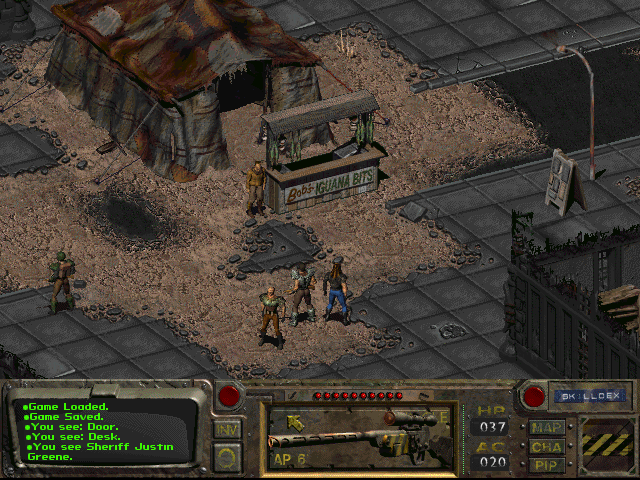
Iguana Bits. The Food of Champions!
Character creation is also classless focusing mainly on picking perks and skills and distributing points among your attributes. If you want to play through the game as a character with zero intelligence, go right ahead. The NPCs will help you through your character's inability to articulate.
The game also made a big deal out of its facial modeling at the time to help gauge what NPCs were thinking when you chose certain dialogue options, though the real meat of the game lay within allowing the player to do whatever they wanted. Within reason, of course. The main quest IS timed meaning that you only have so many in-game days to do what you need to. But you were totally free to go about it in any way you saw fit.
Fallout 2 built on the gameplay of the first but with plenty of improvements while keeping the gore wholly intact. One was that the story was larger in scope with a fairly large number of locations and side quests. It also threw out the time-based requirement allowing the player to explore to their heart's content and run into more of the random weirdness that lived on in the wastes – like the Guardian of Forever from Star Trek (no, it didn't get its own DLC for Fallout 3).
More NPCs were also included allowing you to build up a small army of interesting partners ranging from your favorite dog to a robot named Skynet. You could even repair a car to carry even more loot in its spacious trunk and speed around the Wasteland as long as you had enough cells to keep it juiced.
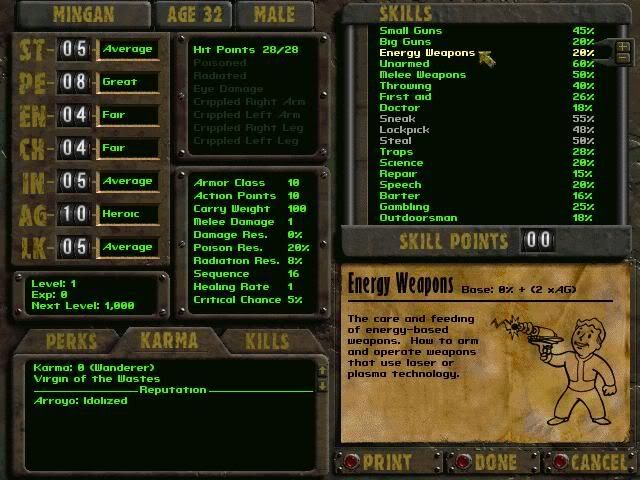
More stats than you could shake a rabid brahmin at
This one dove even deeper into the Fallout world with a number of twists that would be revisited by Fallout 3, though not to the extent that I would have liked to have seen. In the second game, you're the descendant of the hero from the first game and must find a GECK to save your village from destruction. This game was a bit grittier than its predecessor and introduced the Enclave for the first time and vastly expanded the scope of what was at stake in this new frontier.
Not much else had changed between this game and the last leaving you free to decide which on you want to sink your post apocalyptic teeth into. Both are well worth the time spent, though Fallout 2 might be a bit 'easier' on newcomers than the first game since it does away with the schedule.
You could also play as someone with the IQ of a rock again if you didn't get enough from the last game. And the NPCs are just as helpful here, too.
Where to find them:
Fallout on Good Old Games
Fallout 2 on Good Old Games
Fallout 2 on Steam
Fallout 2 on Direct2Drive
Baldur's Gate (1998)
This is the game that put Bioware on the CRPG map. Based in TSR's Forgotten Realms setting using the AD&D 2ed ruleset and in creating the Infinity Engine, the game also introduced the famous (or infamous, depending on who you talk to) real-time combat system. It would also form the foundation for Bioware's real-time combat work in later iterations of the same within other titles, such as the first Knights of the Old Republic or more recently, Dragon Age: Origins.
In this adventure, you start off as a character with a mysterious past (don't they all) who is quickly thrust into a fight for survival to discover why someone wants them dead. Players will encounter potential allies, plenty of enemies, and plenty of flying gibs whenever they kill someone with a critical hit as the PC does all of the d20 rolls from behind the scenes. All of this wrapped up in a huge conspiracy that ties back to the very lore of the Forgotten Realms as opposed to simply paying lip service to the material.
Fans of the setting would find many familiar references worked into the game not only from a visual perspective, but lore-wise as well. For example, the famous drow, Drizzt, makes an appearance. And if your party had the stones to, fight him for his gear (which is actually pretty damn good, especially the chain mail).
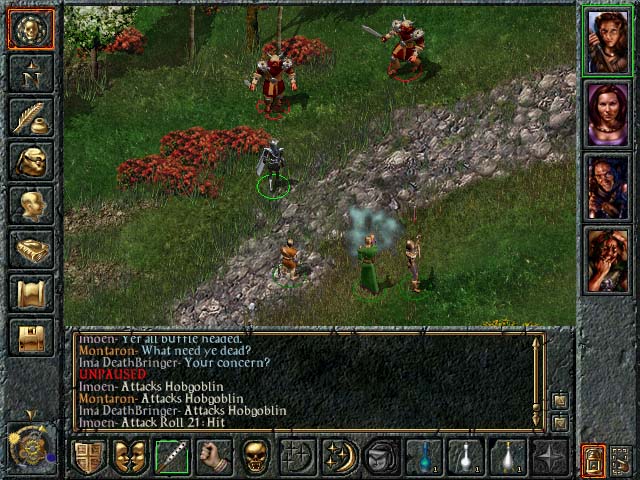
The interface might seem intimidating at first, but it quickly becomes indispensible
Fun characters (Go for the eyes, Boo!), solid combat system, and a decent story made this game an instant classic in the minds of many players. If you want to see where Bioware's design philosophy had begun, this is the game the started it all. You might even pick up on where they found inspiration for several of their later characters here and choke back a tear or two for those that might never be back.
You could even modify some of the files in the game to customize the experience with your own portrait and voice set. I substituted those for my character with Snake Plisskin instead. Worked great. I just wish I could have bought a patch in-game to complete the illusion.
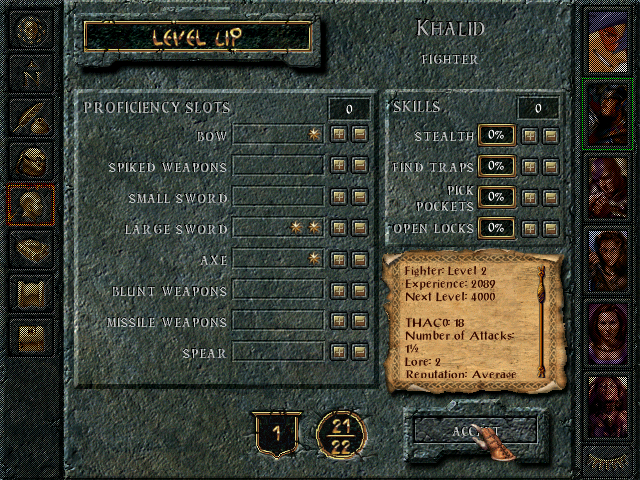
Poring over the details was as much a part of the game as playing it
It also came packaged with a titanic manual that felt more like a compact version of the AD&D Player's Guide complete with an overview of the city of Baldur's Gate by Forgotten Realms' own Volo. Even if you were living in a dungeon somewhere and had never heard of AD&D, it didn't matter thanks to that book. And if you didn't feel like reading, the game was packed with enough built in tips to keep you from getting lost. Arguably one of Bioware's best ever.
Where to find it:
Baldur's Gate on Good Old Games
Gothic (2001) and Gothic 2 (2003)
Never heard of the Gothic series by Piranha Bytes? Don't be surprised. The games don't get much press over here compared to other titles such as Baldur's Gate or Fallout, but they're worth mentioning if only because they won't hold your hand and ease you into their world. Stuff you kill stays killed, wandering where you aren't wanted can put a tombstone over your head the second you turn it, and survival is a matter of finding the right person, the right skills, and a safe place to rest. I had to bite back my explorer's instinct or tread very carefully when I couldn't resist it in either game.
In this game, you're a prisoner on an island surrounded by an impenetrable barrier. Escaping is impossible, but rival factions and your own ingenuity are about to prove everyone wrong. And just because it's an island doesn't mean that there isn't much to do.

Gothic starts you off with the shirt on your back and little else. Best to find something, or someone helpful. Quick.
It's huge. Massive. Almost Oblivion-like in its size. It's also filled with NPCs that follow their own schedules with a degree of realism allowing you to do most anything you want within reason. Collect trophies from animals, cook food, make weapons, learn different skills from teachers…it's a sandbox of stuff to do and it's not an easy game to get under your thumb your first few times in. Don't expect to find any decent armor in this game until several hours have passed. And when I say decent, I mean to say something slightly better than the rags you arrive with.
Getting killed for being a smartass with a sword is as easy to do as wandering into a region you're not ready for yet. The Gothic games have always prided themselves on being grounded with more than a bit of gritty realism than many of their peers, something that asks the player to put in a bit more effort in feeling out the world around them than in simply finding the next NPC to talk to.
There are no clear lines here delineating what you might be ready to take on and the fighting system can can also test your patience as mashing the mouse button is the surest way to get killed in a hurry. But once I had gotten a feel for the action and didn't wander about blindly, the game finally clicked, becoming one of my favorite RPGs. Surviving the game was a triumph in itself. And that was likely the point of the entire endeavor.
The hardest part for new players will be in getting strong enough to live through combat without dying in seconds, to find the right mix of side quests and creature slaying with what you have while tentatively pushing forward. Fortunately, the game is well balanced to give you plenty of options to do so as long as you pace yourself. After that, it'll all come together as an experience you're unlikely to forget anytime soon.
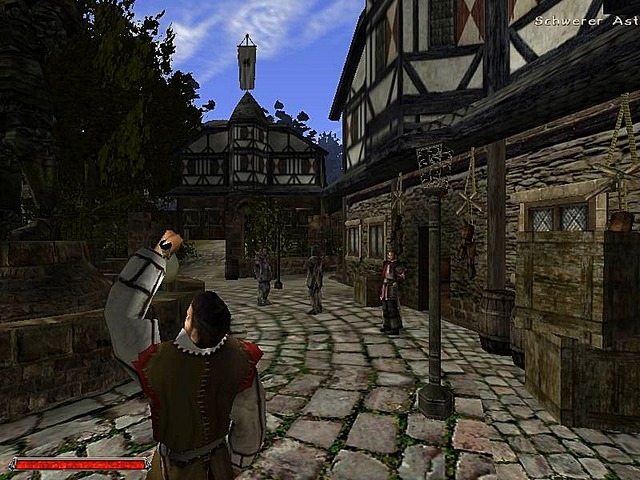
Gothic 2 improves the visuals, polishes the controls (a bit), and will kill you just as fast
The sequel one picks up after your miraculous escape and is just as tough. Now you're on the mainland, but as you'll discover, not everyone is happy to know that you've gotten out. The sequel is a lot like the first one: harsh difficulty curve, finite mobs, and easy deaths. But it does polish the combat controls a bit to make them a little less aggravating to work with. Good Old Games' version even comes with the expansion, Night of the Raven, which wasn't initially available to North America.
Like the first game, it allows the player to do pretty much anything they set their mind to. Pickpocketing everyone in sight, killing beasts for skins, or taking up with one of the factions in order to earn better armor and weapons as rewards for faithful service are only some of the activities you can enjoy in its huge world.
In some ways, the Gothic series can compare quite well with a game such as Bethesda's Oblivion. Both feature expansive worlds and factions, but Gothic manages to edge over it with a consistency to the kind of realism that it fills its world with. Not everyone will be running around clad in plate or heavy armor, or provide the means for you to become the master of everything in the game and combat is more than simply mashing the left mouse buttont. Sacrifices and enemies must be made, but to some players, that's a challenge worthy of any adventurer's salt.
Where to find them:
Gothic on Good Good Old Games
Gothic 2 on Good Old Games
Might and Magic 6-Pack
This is an insane package for ten bucks. So why should you bother? How about hundreds of hours of RPG goodness in one place? I'm not exaggerating, especially with the early games included with this package.
The first Might & Magic by Jon Van Caneghem stood alongside the Ultima, Wizardry, and the Bard's Tale series in the early years as a tough dungeon crawling RPG. The first three games alone were brutal slogs that might make you hate random encounters all over again, but they offered huge open worlds before Bethesda's Arena series had arrived on the scene. We're also talking grid-based movement with 90° turns, turn based combat, and the need for rest and food. Oh, and did I mention that the only places where you can save are at inns?
The very first game is particularly tough and its old school visuals don't hold up as well as its challenge does. And be sure to have a pad of paper handy (which the original boxed game actually came with). If you can take that much, then you'll find yourself in for a big serving of classic dungeon crawling that will make you thankful for the party you can create and then feel a greater sense of relief in later titles as new technology kicks in. Like an automap.
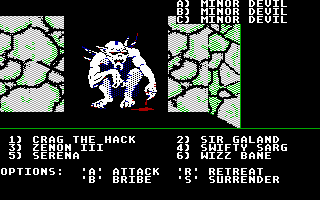
Might and Magic 1 was harsh with a capital H. And at the time, floors and ceilings were hard. Really, they were.
World of Xeen (M&M 4&5) and the Might & Magic 6: The Mandate of Heaven revamped their visuals and streamlined their gameplay to refresh the series, though combat was still a huge part of the experience. Story quality also varied between each game with a greater emphasis on it with later entries. The series also blended together a little sci-fi and fantasy from the start, though don't expect to be wielding ray guns any time soon (well, except perhaps for the sixth game).
Though they might not delve into the same sense of realism that the Gothic series does or flesh out their worlds with the level of detail that Planescape or Arcanum do, what they do offer is a lot of the traditional stuff that goes along with many older RPGs: combat, exploration, and lots of loot. Tons of it. Along with mountains of gold — all the better to pay for training your characters. These titles excelled at filling player's pockets becoming Monty Haul campaigns of the highest order. There was no telling what was out there or what was waiting for you aside from what the included fold out maps hinted at. But there was always loot.
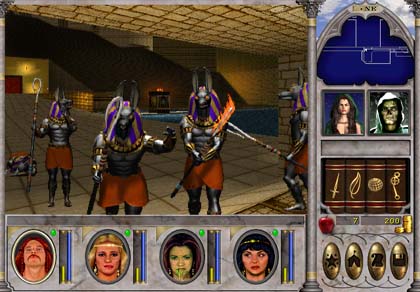
Might and Magic 6 went full, free roaming 3D, a far cry from the series' early days and — oh look, AUTOMAP!!! The third party member on the bottom is also looking a little under the weather. Yeah, might have to do something about that.
Hours could simply be spent grinding through hordes of monsters in the hopes of finding the next staircase or tunnel leading to the next dungeon floor. Planning out who to add to your party proved to be just as challenging. Deciding whether or not to bribe the next horde of monsters to let you go or fight them head on could decide either fortune or a swift death for your party, at least with the first few titles.
These were far different games from the resurrection that Ubisoft had planned with Dark Messiah of Might Magic by Arkane Studios – the same studio behind Arx Fatalis – but that doesn't mean that they were less fun. Classic in every sense of the word.
Where to find it:
Might and Magic 6-pack on Good Old Games
Vampire: The Masquerade – Bloodlines (2004)
This takes place in White Wolf's Vampire universe, a gothic alternative world where vampires and werewolves exist and secretly hold sway beneath the genteel veneer of the 'real' world. And you're one of them. These aren't the kind of vampires that twinkle away, either. These are the kind that see humanity as chattel waiting to be led, fed upon, and then thrown out like yesterday's take out with varying degrees of subtlety.
Plenty of options are packed into character creation from which clan you belong to (which can alter the kind of dialogue you can reply with in game across the board) along with plenty of abilities including vampire powers that can make your afterlife a little easier to live out. Especially when people start shooting at you.

White Wolf's Vampire is a different sort of beast.
But it isn't all about blunt combat. Talking your way through situations, taking on missions, finding the time to feed, and unraveling the conspiracy that you're thrown into are all part of this unique adventure.
Playing as an insane Malkavian made Vampire a character experience unlike many other RPGs, especially with how well the writing fleshed out their rambling replies to everyone (and to certain things) around them. If you had ever wanted to see the world through the lens of someone that talks to themselves and speaks in riddles, here's your chance.
More importantly, the game felt geared towards an adult audience in both its language and surroundings and didn't shirk from some of the more exotic elements that many of the debauched undead within White Wolf's world subscribed to. The Mature label on the box isn't there for the blood and violence alone, nor did the elements feel like cheap gimmicks inserted into the game simply to drum up controversy.
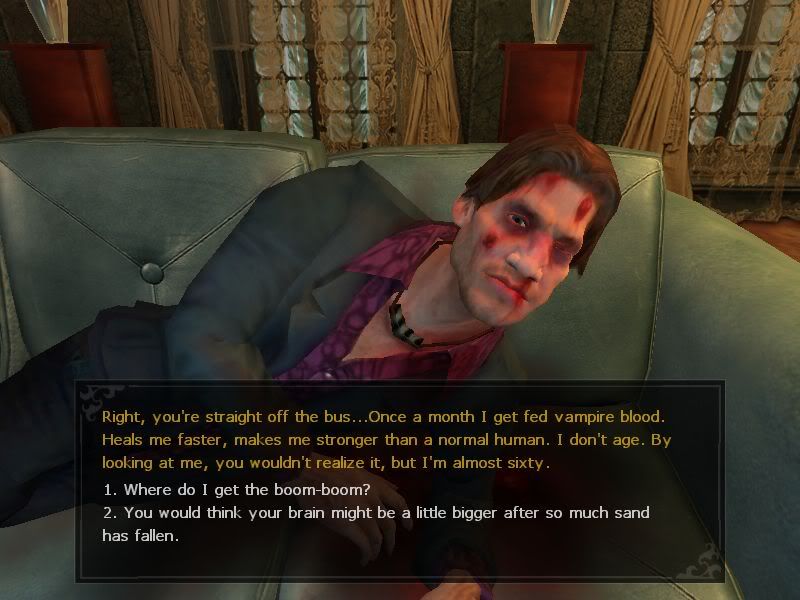
Malkavians make the game better
It was also relatively open with several small venues where the quests take place in, all built on top of Valve's Source engine. Players were free to roam about and encounter the 'night life' of Santa Monica and its surrounding area though don't expect this to be anything like Grand Theft Auto. Still, there was enough freedom here to feel as if it were something of a sandbox with side quests and opportunities to feed on the unsuspecting humans that might cross your path. Unlike most RPGs, you get experience only for completing actual quests – something that might seem eerily familiar to players that had gone through Bioware's Mass Effect 2 six years later.
The third-person combat in the game was not as great as the actual story, though my focused melee character wielding a katana didn't do too badly towards the end. Skill development was also geared to force the player into thinking more on the choices being made as there were only so many points available throughout the entire game. And multiple endings along with how the world reacts to whatever clan you decide to play as just make it all better.
If a lot of the reactive and open-ended gameplay sounds familiar, it's because it was also designed by Troika Games, the same name behind Arcanum and whose members had worked on the Fallout. Unfortunately, it also entered retail with a slew of nasty bugs which didn't help the developer's technical reputation. It was also released in the Fall of 2004, a huge year in gaming, right next to "Halo, Metal Gear Solid, and Half-Life sequels" which didn't help.
Now that it's out on Steam and Direct2Drive (and thanks to a number of player led patch efforts), you should be able to experience the game as it was mostly meant to be.
Where to find it:
Vampire Bloodlines on Steam
Vampire Bloodlines on Direct2Drive
Arx Fatalis
If there's one thing that RPGs can do well on occasion, it's in creating some really far out locales such as that in Planescape: Torment.
Take Arx Fatalis. In this game, you play as an an amnesiac prisoner of gobblers that has to escape the clutches of his gobbler guards. From there, you must make your way to the underground city built to house your people as the sun began to shrink in the sky, freezing the surface forcing everyone below. I can't think of a better excuse to explore endless tunnels, caves, and rediscover buried ruins a la Ultima Underworld style since you're already there. Of course, bad guys are causing trouble and guess who gets to fix things?
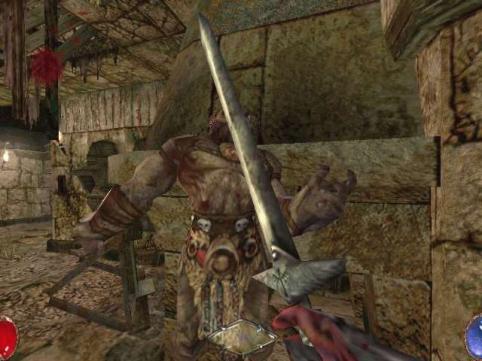
Arx Fatalis shares Gothic's sense of realism, but not quite to the same harsh degree
But being underground doesn't limit what you can do. Arx Fatalis' subterranean world is huge and while it's not quite as hardcore as Gothic's unforgiving combat, it's consistent in that what you kill remains dead. In most ways, after moving out from the city and into the lower caverns, I couldn't help but feel as if I were exploring the kind of places that the original architects had left alone for very good reasons. These were the kind of holes in the ground that they told children never to play near as they built up the foundations for their new home.
Fortunately, there's plenty here to help your leveling aspirations along with side quests and hidden treasure to fill your purse with. An open ended character development system allowed you to craft your hero in whatever direction you wanted. And it always helps that the game plays on the adventurer's instinct to delve as deep as they can to find out what's around that next corner. Exploration is the focus here along with a tiny bit of combat to keep things exciting.
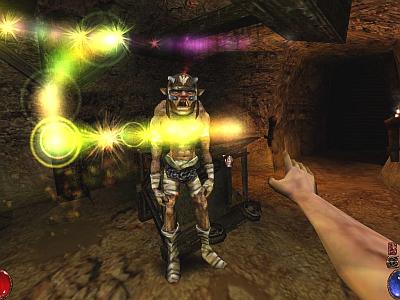 It also uses a “gesture magic” system where you use your mouse as a sort of magic wand to trace the symbol of the spell you want to cast onscreen. This takes a little getting used to and you'll need to find the magic first before you can use it, but it works pretty well once you focus on a few useful tricks.
It also uses a “gesture magic” system where you use your mouse as a sort of magic wand to trace the symbol of the spell you want to cast onscreen. This takes a little getting used to and you'll need to find the magic first before you can use it, but it works pretty well once you focus on a few useful tricks.
Multiple endings also ensure a few more playthroughs, though the end battle that I went through was pretty anti-climactic since it wasn't all that tough. And just like Gothic, though you might be buffed out in armor and wield deadly weapons by the time you get there, the game can still make you feel like a mortal when you least expect it.
Where to find it:
Arx Fatalis on Good Old Games
Arx Fatalis with a Demo on Steam
Deus Ex (2000)
Regarded by many as one of the definitive games of the last ten years if not in PC gaming's history, Deus Ex stands as a giant casting the shadow of its open character development and gameplay over most titles even today. It's a hard benchmark to beat, one that many have tried, and is one of designer Warren Spector's best works to date.
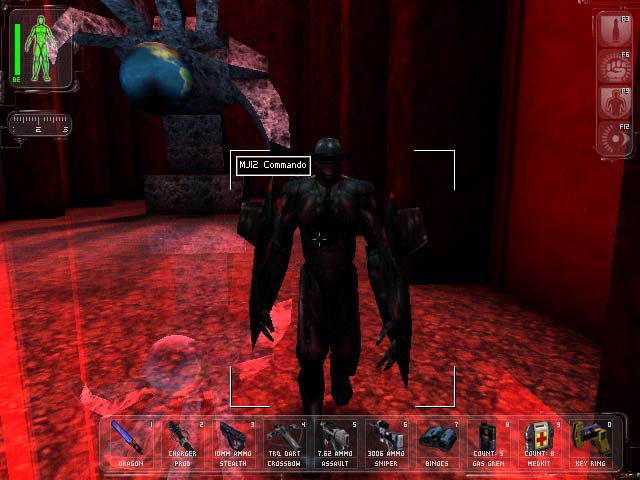 Taking place in a bleak future where cybernetic enhancements are commonplace and in a world suffering from the grip of a deadly plague, you star as JC Denton: a member of the United Nations Anti-Terrorist Coalition. But as you go about your duties in making the world safe, JC will soon find himself pulled into a deadly conspiracy stretching centuries with the fate of humanity as the prize. What shape with the world take? That will ultimately be up to the player to decide.
Taking place in a bleak future where cybernetic enhancements are commonplace and in a world suffering from the grip of a deadly plague, you star as JC Denton: a member of the United Nations Anti-Terrorist Coalition. But as you go about your duties in making the world safe, JC will soon find himself pulled into a deadly conspiracy stretching centuries with the fate of humanity as the prize. What shape with the world take? That will ultimately be up to the player to decide.
Not only was the story a complex and exciting web of conspiracy theories, the game was filled with unique pieces of information found on terminals that JC could hack into or told from NPCs that he might ally with. It also brings in issues such as whether too much technology blended in with humanity is a good thing, or whether it is ultimately where we're headed. Depending on what the player did, the story would dynamically alter certain events to fit in with what the player may or may have not have done. It's also far more action oriented than the other CRPGs on this list owing largely to its FPS elements, so be sure to have your reflexes warmed up, but this is definitely what some have called the "thinking man's shooter".
This kind of open ended approach extended far into the actual gameplay as well from the kind of augmented abilities that you could upgrade JC with to the very weapons that he could use. Though it didn't quite extend into the gameworld allowing JC to just go where he pleased, it turned his character into a shapeless lump of statistics driven clay that you could mold in any way that you wanted. For me, this meant on focusing JC into stealth and indirect combat with a sniper rifle to get the drop on enemies which worked out pretty well. Of course, it also left my character open to other issues such as when he would get involved in certain boss battles later on, but that's all a part of the challenge.
By the time I made it to the end, the sniper rifle I had upgraded could probably have shot a satellite out of orbit. And thanks to JC's enhancements, if the enemy got too close, I could at least survive long enough to find a new hiding place to set up shop – or whip out my nanotech sword and deal with them that way thanks to a little combat strength.
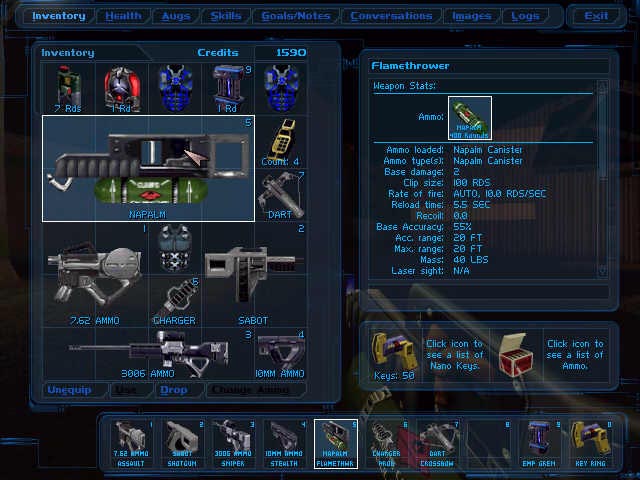 If stealth isn't your thing, however, the game also loads you up with tons of state-of-the-art weapons ranging from stealth pistols to plasma rifles along with battle oriented augments. I found, though, that direct firefights with many enemies in the game to be a lot more challenging than in simply sneaking on by and then sniping them, so plan accordingly
If stealth isn't your thing, however, the game also loads you up with tons of state-of-the-art weapons ranging from stealth pistols to plasma rifles along with battle oriented augments. I found, though, that direct firefights with many enemies in the game to be a lot more challenging than in simply sneaking on by and then sniping them, so plan accordingly
Deciding on whether you want to sneak through air ducts to get the job done or blow away the welcoming committee so they won't bother you at all is completely up to the kind of challenge you want. Jumping back to earlier saves and experimenting with the different options at hand and in trying out different responses with the NPCs, including playing around with the multiple endings, was simply too much fun.
The interface was also a masterpiece with plenty of options that recorded conversations, notes taken by JC, logs, and anything else that you might discover in the game. Not only that, but you could also punch in your own notes if you wanted to.
Unless you've been abducted by aliens, don't miss out on it.
Where to find it:
But isn't there more?
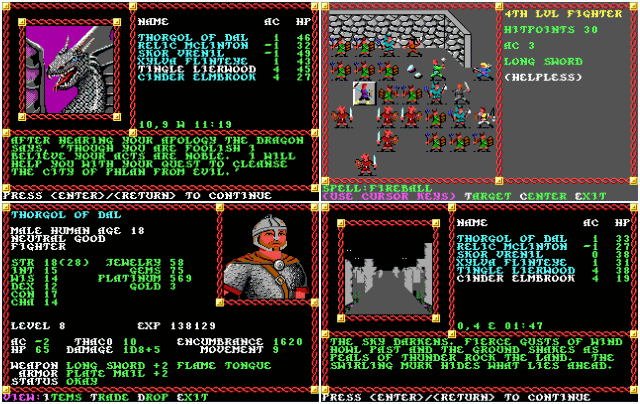 Absolutely. Even though not all of them have aged very well especially in terms of looks or mechanics, there's plenty more to play through and stories to be told.
Absolutely. Even though not all of them have aged very well especially in terms of looks or mechanics, there's plenty more to play through and stories to be told.
Classics from SSI's titanic catalog such as the Gold Box series, when Interplay was king with the Bard's Tale and Wasteland, Sir-Tech's Wizardry, and Origin's catalog of epic awesomeness ranging from System Shock to Ultima. But until either service can get a hold of these, or when the respective license holders decide to re-release them to the public, the most that anyone can do is wait. Of course, you can find many classics on places like Ebay, some of which work fine under Windows with a little tweaking or help from utilities such as DOSBox.
Or sometimes fans just take things into their own hands. For example, if you own Dungeon Siege for the PC, there's a free mod out there called Ultima V Lazarus that transforms it into an updated version of…well…Ultima V. Awesome.
Let's just hope that Steam, Direct2Drive, and Good Old Games continue to grow their catalogs to help keep the oldies alive for the next generation. There's a lot of lost treasure still out there.
